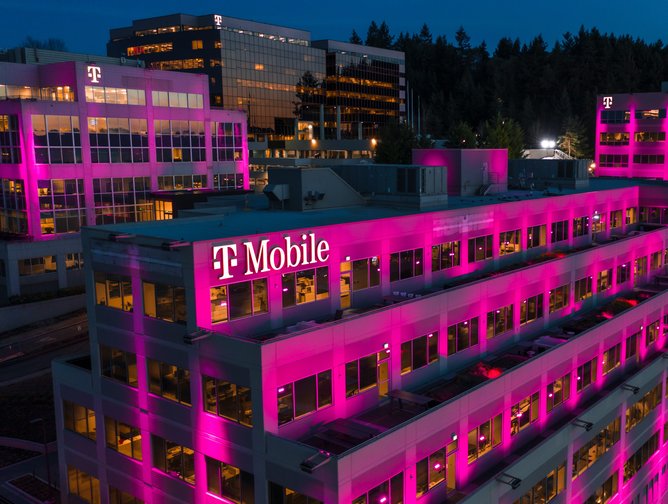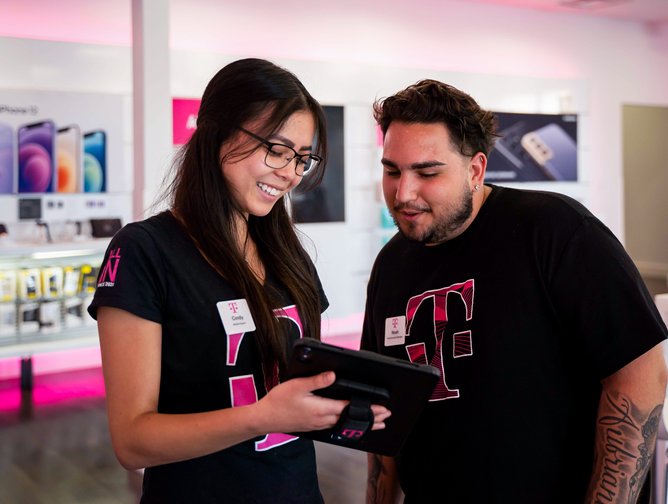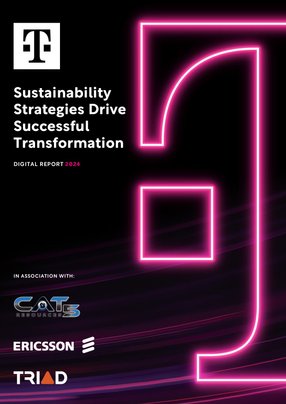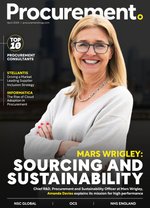T-Mobile: Strategies Driving Sustainability Transformation
Delivering the country’s largest, fastest and most awarded 5G network in the United States, T-Mobile has a goal to offer reliable connectivity for all. Today, as the world transitions to a net-zero economy, its mission to be the best at connecting customers to their world is more important than ever.
To manage its impact on the planet, T-Mobile has announced several leading initiatives in the field of sustainability. The company – referred to as the ‘Un-carrier’, to highlight its ambition to supply customers with the best network and best value – is committed to improving energy efficiency and investing heavily in product circularity.
According to its most recent Corporate Responsibility Report, T-Mobile has made several bold moves around environmental sustainability, including sourcing 100% of its electricity from renewable sources and committing to net-zero emissions by 2040.
As explained by its Director of Sustainability Chad Wilkerson, environmental sustainability “is a challenge across all industries in which T-Mobile operates”. To address this challenge, T-Mobile is working closely with suppliers to “foster a robust, diverse and sustainable supply chain, with relationships grounded in mutual respect”. He adds that policies, practices and engagement strategies “guide the entire supplier journey, setting clear expectations and paving the way for a more sustainable future”.
T-Mobile’s sustainability mission is multifaceted, ranging from the energy associated with running the largest 5G network in the United States to the process of reusing and recycling used customer devices.
In 2022, T-Mobile collected 11.7 million customer devices to be reused, resold or recycled, and 94% of its offered wireless handset models are certified through UL ECOLOGO or EPEAT certifications.
“The team here does a great job working with our handset, tablet and device providers that we offer to our customers working towards these certifications,” Wilkerson says.
He goes on to explain how the company’s supply chain strategy has evolved in recent years:
“We can now procure all of the products and services we need to provide connectivity and services to our customers. This strategy begins with our supply chain and a responsible sourcing programme. This engages suppliers to not only provide goods and services that are efficient but also helps them put their own sustainability goals and plans in place.”
Wilkerson says this “circular effect” typifies T-Mobile’s sustainability strategy, which is based on building collaborative relationships with suppliers and “finding ways to move forward responsibly”.
He adds: “We’re engaging more and more with our partners. T-Mobile is lucky to have acquired substantial experience around sustainability, and we realised that, sometimes, we have experienced things other companies haven’t, yet.”
Building a resilient network sustainably
Today’s telecom customers demand better and more reliable connectivity, and T-Mobile’s network is continually evolving to meet these needs. Wilkerson shines a light on T-Mobile’s progress to deliver much-needed infrastructure to build a smart, connected network of the future, while also ensuring this infrastructure is built in a sustainable way.
“Part of our strategy involved making our network as sustainable as possible,” he says, “and that’s where we look at how we’re powering that network, the equipment and exploring the efficiency that’s designed into it.”.
The connectivity T-Mobile provides its customers is critical and it’s striving to provide service wherever customers are. Of course, this goal comes with an environmental footprint, around which the company is taking decisive action.
“We are making progress here,” Wilkerson says. “For example, we were the first in the US wireless industry to set and achieve a 100% renewable energy goal, even as our merger with Sprint greatly expanded our electricity needs.”
As Wilkerson stresses, customers rely on T-Mobile to deliver high-speed, reliable wireless connection 24/7. This need, he says, is even more acute should disaster strike.
This is why, he says, T-Mobile has 24/7 national engineering response and crisis management teams, a comprehensive telecoms infrastructure and employee volunteers to ensure network reliability.
“First responders, local authorities and impacted communities rely on communication networks to support rescue, recovery and relief efforts,” says Wilkerson. “With extreme weather events becoming more intense and frequent, advanced preparation for potential disruptions and significant network traffic is critical for our business and our customers. Emergency preparedness and network resiliency are among our most urgent priorities.”
Tackling Scope 3 emissions in T-Mobile’s supply chain
Another priority for T-Mobile is reducing emissions across its supply chain. The company has cut its Scope 1, 2 and 3 emissions by 20% since 2020.
Scope 1 emissions are those an organisation controls directly, such as its fleet of vehicles. Scope 2 are emissions a company causes indirectly, such as those from generating the electricity it uses across its operations. But it is Scope 3 emissions that are the most serious issue. These are produced by third parties up and down a company’s supply chain, and can account for up to 80% of a business’s total emissions.
In 2023, T-Mobile became the first company in the US wireless sector to set a net-zero goal for all three Scopes. These were validated by the Science Based Targets Initiative’s (SBTi) Net-Zero Standard. This is the world’s first framework for company targets that aligns with the latest climate science. To tackle ongoing Scope 3 challenges, T-Mobile works with thousands of businesses on sustainability initiatives.
This process is underpinned by support from key partners who assist with emissions reduction. One of these is T-Mobile’s energy partner, Sable Power and Gas.
“We work with Sable for its expertise in developing procurement strategies,” Wilkerson explains. “Energy drives a good portion of our Scope 2 emissions, and we work with Sable on efficient energy procurement across our network.”
T-Mobile also works closely with key partner Ericsson, on bringing in the equipment needed for T-Mobile to expand its offerings. It also benefits from Ericsson’s insights on energy efficiency.
Wilkerson explains that T-Mobile engages with its suppliers in different ways to tackle scope emissions.
“We've implemented supplier screening,” he says, “and leverage a third-party service to detect risks within the supply chain, not just on the environmental front but also on the social front.”
Part of the screening process is ascertaining a supplier’s carbon footprint, investigating its net-zero strategy, verifying science-based targets and quantifying how much renewable energy a supplier uses.
“We expect our suppliers to share our strong commitment to ethical business practices and we outline these expectations which include accessibility, environmental priorities and the protection of human rights,” Wilkerson explains. “We set expectations and engage with our suppliers and have stringent processes in place to support our commitments.”
T-Mobile also works closely with suppliers on their human rights policies, particularly how they communicate with employees around this, and whether they have public policies in place. For accountability and benchmarking, data is needed to understand suppliers’ commitments and how they are tracking their progress on this front.
“We’ve been setting the stage for this foundational work for several years, tracking and assessing our Scope 3 emissions so we could benchmark and continue quantifying them,” says Wilkerson. “This is not the norm for the wireless industry because there weren’t requirements to report on Scope 3, and companies weren’t even looking at it.”
To support T-Mobile’s commitment to achieving net-zero emissions by 2040, the company reports its emissions in accordance with GHG protocol. This enables its teams to focus on engaging with suppliers to achieve greater transparency around Scope 3. By leveraging data, the company is able to work closer with suppliers, and help them integrate T-Mobile’s reporting processes into their everyday practices.
“Being able to monitor supplier emissions data year-over-year helps us make real progress on our sustainability goals. We are constantly learning ways to better support our suppliers around emissions,” says Wilkerson.
This is not a new undertaking, because for years T-Mobile has been collaborating with partners to help it shape its sustainability agenda, and the company continues to evolve as it learns about fresh challenges facing suppliers of all sizes.
“We realised that we had to get larger suppliers aligned,” Wilkerson says. “Looking forward, we’re going to have an impact on all our suppliers, because of the work we do with them.”
Taking a forward-thinking approach
With a long track record of dedication to building a more sustainable future, T-Mobile is adopting a forward-thinking strategy, as Wilkerson and his team look to increase awareness of sustainability issues in its supply chain, and share insights into its supply network.
Here, it’s all about continuous improvement, ensuring all stakeholders are on board with a more collaborative approach to renewable energy adoption, and with creating greater efficiencies, both operationally and financially.
As for the future, Wilkerson says there will continue to be ongoing challenges and opportunities regarding Scope 3 reporting and reduction, as it works closely with partners to ensure standards are met. “These efforts will continue to impact the business and the environment for decades to come,” he says, adding: “We’ll continue to look at our energy efficiency and renewable energy programmes. We now use 100% renewable energy but want to continue reducing the volume of energy we use, and sustain our renewable energy purchasing.”
**************
Make sure you check out the latest edition of Procurement Magazine and also sign up to our global conference series - Procurement & Supply Chain LIVE 2024
**************
Procurement Magazine is a BizClik brand






